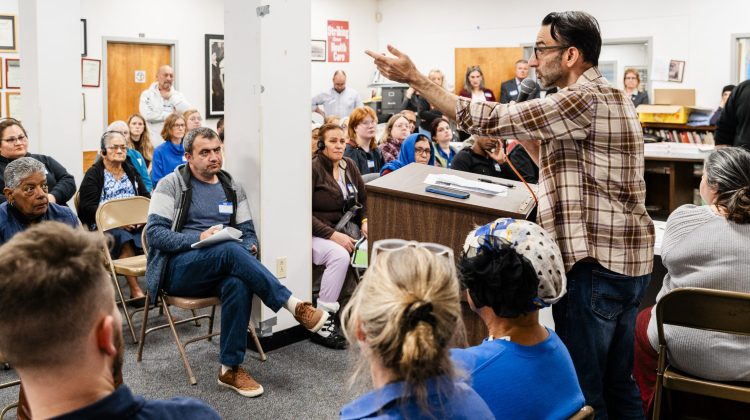LYNN — North Shore legislators heard from local healthcare workers and educators regarding the effect of Medicaid and SNAP budget cuts on their communities at the “Protect Our Care” town hall on Wednesday.
Federal budget cuts passed in July, as part of what was previously known as “The Big Beautiful Bill,” will put up to 350,000 people in Massachusetts at risk of losing their Medicaid and SNAP benefits.
To combat this, Raise Up Massachusetts is urging elected officials to use $1.2 billion out of the $8 billion in the State’s “rainy day” emergency fund.
The coalition is also proposing the Mass Corporate Fair Share bill, which will raise $400 million annually by making large global mega corporations pay the State’s corporate tax on more of the profits they shift overseas.
The federal government uses a system known as NCTI (formerly GILTI), to tax the U.S.-generated profits that large global corporations stash in offshore tax havens.
Massachusetts currently only includes 5% of NCTI when calculating the total corporate income subject to the state’s 8% corporate income tax rate, while the federal government and most New England and Mid-Atlantic states — like New Hampshire, Rhode Island, Vermont, and Maine — include 50-60% of NCTI in their calculations, according to Raise Up Massachusetts.
Shantell Smith — who is a Department of Transitional Assistance employee, a Lynn native, a single mom, and a domestic violence survivor — gave a testimony about the impact she believes the budget cuts will have on local youth’s education.
“Lynn is already a city of poverty. Most of our parents are low income. These cuts can cause more homelessness, more domestic violence, more desperation, more crimes,” Smith said.
She added, “We have students who are more likely to commit crimes because they’re struggling and they don’t have the things they need. Food is a basic necessity of life, and it shouldn’t be taken away from families who are already working and already struggling as is.”
Lynn United for Change Executive Director Isaac Simon Hodes pressed lawmakers to take immediate action regarding the budget cuts.
“We can see what’s coming because of these cuts. Behind these numbers are people, and these cuts are going to be written in blood. Every single cut here means a life destroyed, a family broken,” Hodes said.
Hodes added, “We have a lot of elected officials who are great at talking about the threat against democracy, and if that’s the truth, we need to put that into play and defend our people and institutions right now.”
State Sen. Joan Lovely (D-Salem) and State Representatives Sally Kerans (D-Danvers), Hannah Bowen (D-Beverly), and Thomas Walsh (D-Peabody) gave their thoughts on the Corporate Fair Share Bill and the possibility of dipping into the State’s rainy day fund.
While Kerans, Bowen, and Lovely said they plan on sponsoring the Corporate Fair Share Bill, Walsh said he plans on taking a closer look at the legislature to “understand the language and make sure we remain competitive as a state.”
When it comes to tapping into rainy day funds, the legislators remained open to the possibility but cautioned possible consequences.
“The question has to be on the table. We need to be responsible in maintaining some reserves, and we have to be willing to tackle those reserves when we need it. And I think healthcare, housing, the basics of taking care of each other, are those things we need to consider,” Bowen said.
Lovely said, “It affects our bond rating, but we have to look at it. I’ve been talking to my colleagues about tapping into the rainy day fund, because these cuts are devastating.”
Kerans said local lawmakers need to observe how the budget cut situation evolves before making certain financial decisions.
“The watchword is stability. We have to have more information to see what the result will be and how that will impact future borrowing costs and other collateral impacts,” Kerans said.
Walsh said he “anticipates” that rainy day funds will be allocated in response to the budget cuts, but is currently unsure of the amount. He also described a “hard truth” to the town hall crowd from his perspective.
“We are not, as a State, going to be able to backfill every cut that the federal government has delivered to us. We have to be cautious because within a couple of years, we could have no rainy day fund,” Walsh said.
The protect our care town hall was convened by Raise Up Massachusetts and supported by Lynn Teachers Union, American Federation of Teachers Massachusetts, Massachusetts Teachers Association, Massachusetts Senior Action Council, Lynn United for Change, The New Lynn Coalition, SEIU, Neighbor 2 Neighbor, and the Massachusetts Law Reform Institute.




